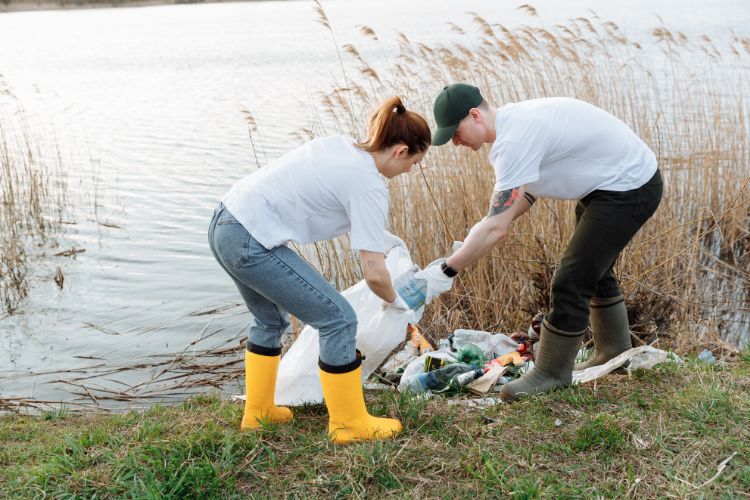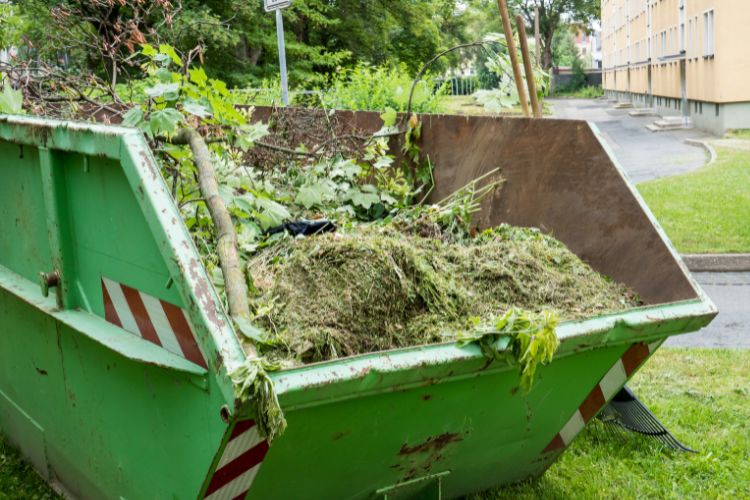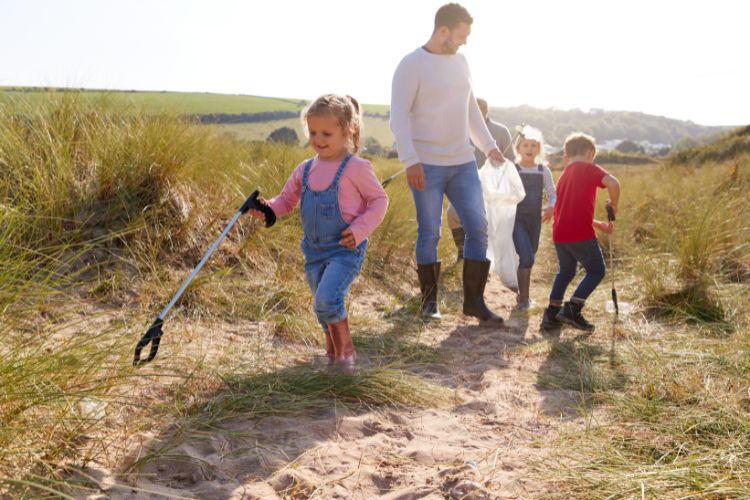Keeping your neighbourhood clean creates a nicer, healthier, and safer place for you and your family to live. However, sometimes rubbish builds up. Organising a neighbourhood clean-up is a great way for the community to keep their local space looking great.
One of the key things you’ll need to consider when planning your clean-up is how you’ll store and dispose of the rubbish, green waste, and other unwanted items you collect. Skip bin hire helps provide an easy way to remove rubbish and is a staple for community clean-ups.
On this page, we’ll look at the different skip bin options available and provide some tips on organising a clean-up for your neighbourhood.

General Waste Skip Bins
General waste skip bins have a capacity of 150kg and are for household rubbish disposal. The type of rubbish you would put in your regular wheelie bin is what should go into your general waste bin. This will most likely end up at a waste management site where professionals organise rubbish so it can be disposed of responsibly.
The waste types you can put in a general waste skip bin include:
- Household waste
- Light construction debris and building materials
- Green waste
- Furniture, appliances and cabinets
- Metal and steel
Never put hazardous materials in a general waste bin, such as harmful chemicals, asbestos, or potentially explosive materials. Heavy materials like bricks, large stones, tiles, or concrete should also not be placed in your general waste skip.
Green Waste Skip Bins
Green waste skip bins are specifically for plant waste disposal. Ideal for big landscaping or gardening projects or cleanups after a major weather event like a cyclone, flood, or tropical storm.
Types of materials for a green waste skip bin include:
- Grass clippings
- Small branches
- Bark chips
- Small tree trunks under 150mm in diameter
- Untreated timber
When deciding what should go in a green waste bin, consider what naturally degrades. Things like leaves, plants, flowers, and similar items will biodegrade naturally, meaning they should go in your green waste bin.
Food waste shouldn’t be thrown into your green waste bin as it may not compost easily due to preservatives. Also, do not put soil or treated timber in a green waste bin.

Recycling Bins
Recycling is one of the main ways of moving towards a more sustainable waste management system for our community. For it to be successful, though, it’s essential everyone involved knows what is and isn’t recyclable. These things generally go in recycling bins:
- Hard plastic
- Aluminum (including drinks, deodorant cans)
- Cardboard and paper
- Glass
- Steel (including pet food tins)
Recycling helps reduce landfill and is good for the environment. A community cleanup serves as a great opportunity to educate and encourage people to recycle when they can.
Organising a Community Cleanup
Pick a location: The first thing you need to do is choose a location. Ideally, it’ll be somewhere that needs some attention but is also loved by the community. Places like parks, playgrounds, rivers, beaches, and nature reserves are all good places to start.
Choose a date and time: Consider that on weekdays people will likely be working, and Saturday mornings are often a popular time for sports and other activities. Also, avoid days like Mother’s Day and public holidays where people may be otherwise unavailable.
Plan logistics: This includes organising supplies such as gloves, bags, and even tools for cleaning up. This is also a great time to start looking into skip-bins you’ll need for the clean-up.
Consider both the type of skip bin you’ll need and the skip bin size. Not sure what to choose? Our team can answer any questions and provide suggestions on the best solution for your needs.
Involve the community: There are plenty of ways to get the word out about your cleanup. You can share the event on social media, involve local businesses, go door to door, and put-up notices. Encourage people to bring their family and friends to help boost numbers.
The day of the clean-up: The big day is here. Thank everyone for giving up their time and discuss with everyone how you’ll approach the project. Give out essential details like where people can get supplies, where rubbish goes, and the scope of the area you’re going to clean. After that, it’s time to get cleaning!

Safety and Efficiency Tips for Cleanup Days
Clean-ups are important, but so is the safety of your volunteers. Here are a few tips for keeping everyone healthy and safe as well as some techniques for rubbish collection and segregation.
- Tell participants to wear appropriate clothing such as long pants, enclosed shoes, gloves, hats, and sunglasses.
- Have plenty of sunscreen and water on hand, especially on hot days. Keep in mind that UV rays can still cause harm even on cloudy days.
- Encourage people to pace themselves and only take on what they can handle. Heavier items should be left to stronger volunteers.
- For heavy items, encourage people to use responsible lifting techniques and equipment if necessary.
- Create teams to focus on certain areas so you can divide the project into smaller, manageable goals.
- Make some signs or posters that specify what goes in which bin to make it easy for volunteers.
- Provide adult supervision for any children participating in the cleanup.
- Have some first aid on hand for any cuts or injuries.
Take Pride in Your Neighbourhood
Cleanups are a great way for residents and businesses to give something back to the community. Skip bins provide a simple, convenient, and effective means of storing and removing rubbish from a property or site. The choice of both skip bin size and type will help with the appropriate disposal of waste.
Best Price Skip Bins
If you’re ready to organise a community clean-up, our team is here to help. With a wide range of skips available, we can help with your waste disposal needs. We’ll deliver the skip to your desired location and once you fill it, we’ll take care of the rest. Contact us today to organise your next skip bin hire!
